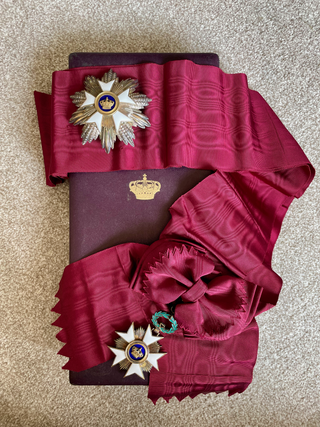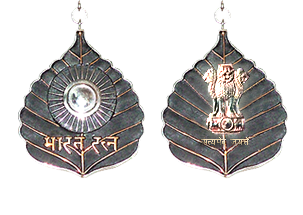
Politics of Kiribati takes place in a framework of a parliamentary representative democratic republic, whereby the Beretitenti, President of Kiribati, is both the head of state and head of government, and of a multi-party system. Executive power is exercised by the government, Beretitenti, and his cabinet, all MPs. Legislative power is exercised by the House of Assembly. The Judiciary of Kiribati is independent of the executive and the legislature. The Constitution of Kiribati, promulgated at independence on 12 July 1979, establishes the Republic of Kiribati as a sovereign democratic republic and guarantees the fundamental rights of its citizens and residents.

The Order of Leopold is one of the three current Belgian national honorary orders of knighthood. It is the oldest and highest order of Belgium and is named in honour of its founder, King Leopold I. It consists of a military, a maritime and a civil division. The maritime division is only awarded to personnel of the merchant navy, and the military division to military personnel. The decoration was established on 11 July 1832 and is awarded by Royal decree.

The Order of the Crown is a national order of the Kingdom of Belgium. The Order is one of Belgium's highest honors.

The British Empire Medal is a British and Commonwealth award for meritorious civil or military service worthy of recognition by the Crown. The current honour was created in 1922 to replace the original medal, which had been established in 1917 as part of the Order of the British Empire.
An overview of South African military decorations and medals, which form part of the South African honours system.
The orders, decorations, and medals of Canada comprise a complex system by which Canadians are honoured by the country's sovereign for actions or deeds that benefit their community or the country at large. Modelled on its British predecessor, the structure originated in the 1930s, but began to come to full fruition at the time of Canada's centennial in 1967, with the establishment of the Order of Canada, and has since grown in both size and scope to include dynastic and national orders, state, civil, and military decorations; and various campaign medals. The monarch in right of each Canadian province also issues distinct orders and medals to honour residents for work performed in just their province. The provincial honours, as with some of their national counterparts, grant the use of post-nominal letters and or supporters and other devices to be used on personal coats of arms.
The Order of Leopold II is an order of Belgium and is named in honor of King Leopold II. The decoration was established on 24 August 1900 by Leopold II as Sovereign of the Congo Free State and was in 1908, upon Congo being handed over to Belgium, incorporated into the Belgian awards system. The order is awarded for meritorious service to the sovereign of Belgium, and as a token of his personal goodwill. It can be awarded to both Belgians and foreigners, and is seen as diplomatic gift of merit.
The Fijian honours system dates from the granting of Dominion status in 1970, when the Fijian Independence Medal was awarded to participants in the Fijian independence celebrations. Prior to two military coups, which deposed Elizabeth II as Queen of Fiji, ending the monarchy of Fiji, Fiji also had use of the British Honours System.

The Meritorious Service Medal is a decoration that is, within the Canadian system of honours, one of the two Meritorious Service Decorations gifted by the Canadian monarch, through the Governor-in-Council. Created in 1991, the medal is intended to recognize individuals—both Canadian and foreign—who have carried out meritorious acts bringing benefit and honour in either of two categories: military and civilian. Award of the medal grants recipients the ability to use the post-nominal letters MSM.
South African orders, decorations and medals are those military and civilian orders, decorations and medals issued by the Government of South Africa. The following is a (non-exhaustive) list of these:

The Meritorious Service Cross is a decoration that is, within the Canadian system of honours, one of the two Meritorious Service Decorations gifted by the Canadian monarch, his or her Governor-in-Council. Created in 1984, the medal is intended to recognize individuals—both Canadian and foreign—who have carried out meritorious acts bringing benefit and honour in either of two categories: military and civilian.

The Indian honours system is the system of awards given to individuals for a variety of services to the Republic of India. The categories of awards are as follows:
The South African honours system consists of orders, decorations, and medals which are conferred on citizens, and others, to recognise a range of services and achievements. The system has developed since 1894.
Nigerian National Honours are a set of orders and decorations conferred upon Nigerians and friends of Nigeria every year. They were instituted by the National Honors Act No. 5 of 1964, during the First Nigerian Republic, to honour Nigerians who have rendered service to the benefit of the nation.
In the Democratic Socialist Republic of Sri Lanka, individuals are recognized for personal bravery, achievement, or service with the with national honours. The national honours consists of several types of awards:
The Armed Forces of India are eligible for many military decorations awarded for extraordinary bravery and distinguished service during times of war and peace. Service and campaign medals have been awarded throughout India's history as an independent state.
The Honours and Awards System of Samoa has its basis in the Merit Act 1992/1993 and the Honours and Awards Act 1999. From 1914 to 1962, Samoa was governed as the Western Samoa Trust Territory by the United Kingdom and New Zealand. During this time, awards of the British honours system were made to select individuals. For example, the first Prime Minister of Samoa, Fiame Mata'afa Faumuina Mulinu'u II was made a Commander of the Order of the British Empire and Le Mamea Matatumua Ata, a framer of the constitution of Samoa, was made an Officer of the Order of the British Empire on the New Zealand list in the 1960 Birthday Honours.

Louisa Murdoch Humphry is an I-Kiribati artist and master weaver with over thirty years of experience. Humphry grew up in Kiribati and now resides in New Zealand. In 2019, her work was recognised with a Pacific Heritage Artist Award alongside Kiribati artist Kaetaeta Watson at the Arts Pasifika Awards. In 2021, she was appointed an honorary Member of the New Zealand Order of Merit, for services to the Kiribati community and culture.

The Kiribati Grand Order is the highest honour of Kiribati. The order was founded in 1989 under President Ieremia Tabai by the Presidential Act of 1 June 1989 which established the Kiribati honours system.
 Kiribati Grand Order (K.G.O.) (Gilbertese: Ana Tokabeti Kiribati (A.T.K))
Kiribati Grand Order (K.G.O.) (Gilbertese: Ana Tokabeti Kiribati (A.T.K)) Kiribati National Order (K.N.O) (Ana Kamoamoa Kiribati (A.K.K))
Kiribati National Order (K.N.O) (Ana Kamoamoa Kiribati (A.K.K)) Kiribati Cross (K.C) (Ana Kaibangaki N Ninikoria Kiribati (A.K.N.K))
Kiribati Cross (K.C) (Ana Kaibangaki N Ninikoria Kiribati (A.K.N.K)) Kiribati Order of Merit (K.O.M) (Boutokan Toronibwain Kiribati (B.T.K))
Kiribati Order of Merit (K.O.M) (Boutokan Toronibwain Kiribati (B.T.K)) Meritorious Service Award (M.S.A) (Raoiroin Rakan Te Mwakuri (R.R.M))
Meritorious Service Award (M.S.A) (Raoiroin Rakan Te Mwakuri (R.R.M)) Kiribati Long Service and Good Conduct Award (K.L.S.G.C.A) (Kanikinaean Te Bekumwaka Ma te Kakaonimaki (K.B.K))
Kiribati Long Service and Good Conduct Award (K.L.S.G.C.A) (Kanikinaean Te Bekumwaka Ma te Kakaonimaki (K.B.K))






